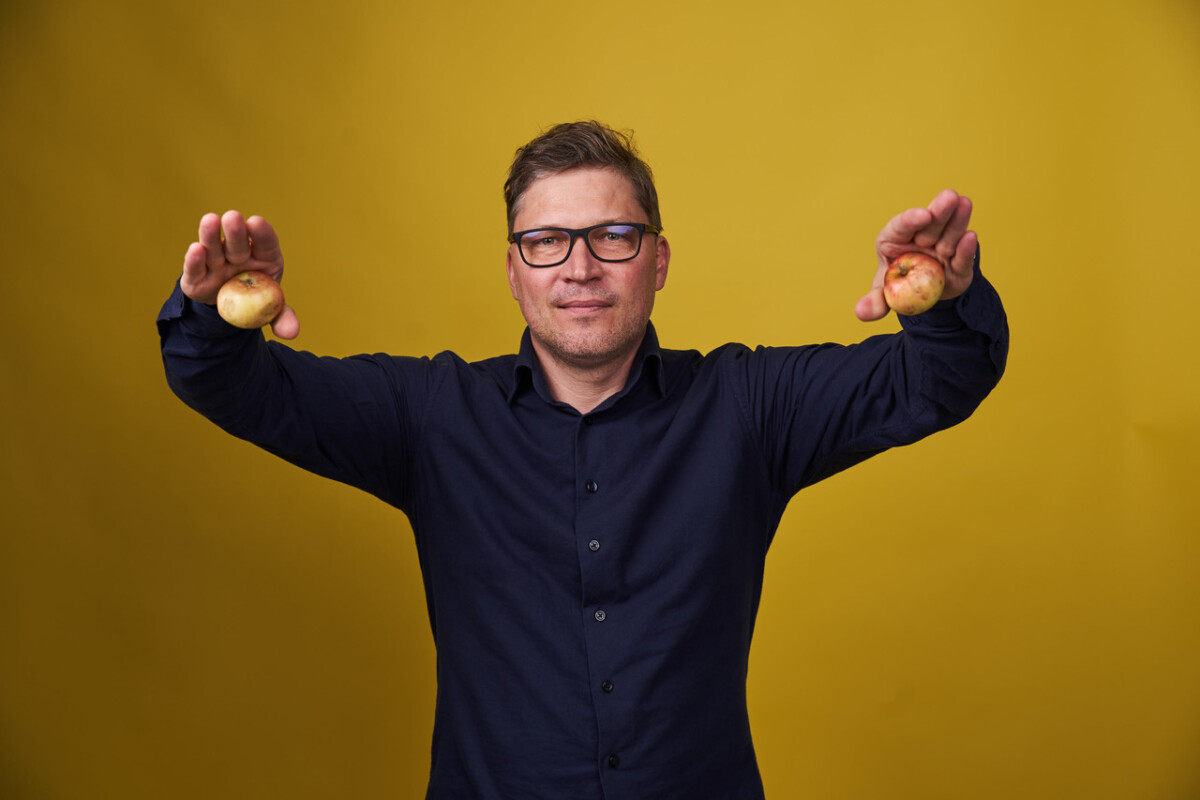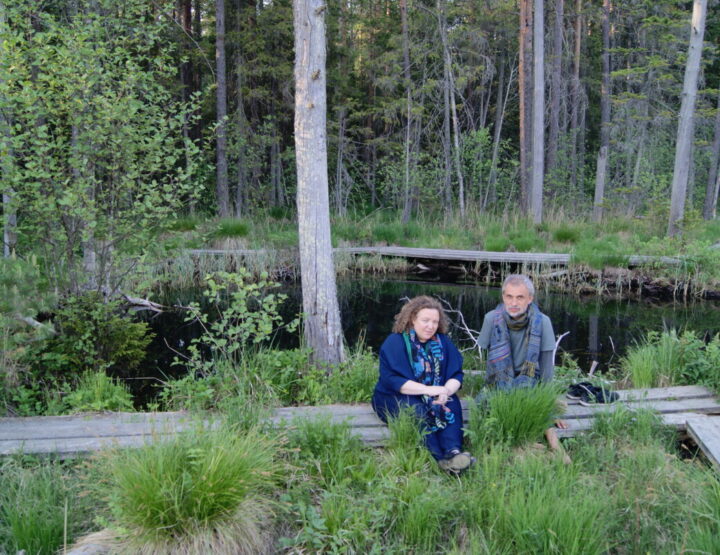In 2007, Martin Algus had a dual victory: his problem play Janu (Thirst) and youth play Ise oled! (You Are!) received first and second place, respectively, in the Estonian Theater Agency’s playwriting competition. The jury commented that both works reflect upon modern society and the author himself doesn’t argue, acknowledging that they spring from his past and present alike.
Algus’s 2007 plays were his debuts, and a pattern began to form from that thirst and you-are-ism, though its roots extend much deeper. The author, who studied at the Viljandi Culture Academy, started translating contemporary foreign drama into Estonian while working as an actor and searching for theatrical works to perform. It was thanks to his efforts that the drama by Mark Ravenhill, and Oleg and Vladimir Presnyakov first found its way into the Estonian language. He received the Estonian Theater Association’s Aleksander Kurtna Prize for Translation in 2004 and has translated nearly thirty plays to date. While Algus enjoyed playing simple characters on stage, he found some roles hard to identify with; saying he only began to comprehend what a play could truly convey once he started translating. As a reflection of this understanding, this piece gives translators of Algus’s work an opportunity to comment on his writing. As of today, there are nearly twenty translations of Algus’s drama.
“The first thing that comes to mind when I think of Martin’s style is his intuitive sense of structure, narrative, and drama; how he proceeds from the story. Reading his works, you feel that the point of departure is precisely the story he wishes to tell. Added to that is his incredible professionalism and confident, polished writing.”
(Varja Arola, who translated Algus’s play Kaheksajalg (The Octopus) into Finnish)
Also coming from a place of high societal tension are his plays Postmodernsed leibkonnad (Postmodern Families, 2009) and Väävelmagnooliad(Sulfur Magnolias, 2013), both of which were awarded in the Estonian Theater Agency’s playwriting contest and staged soon after. The latter of the two received the Estonian Theater Union’s Award for Original Drama, with judges commending the way it breathes new life into the classical playwriting style and addresses pressing social issues through finely tuned dialogues.
While Postmodern Families surprised readers and audiences by examining family patterns from an LGBTQ angle – something still extremely rare in Estonian drama – Sulfur Magnolias brings into focus the problems that surround the care of elderly parents while further complicating the situation with a previously abusive relationship. The rhythms and pauses used elevate the story above commonplace woes and give it an outside poetic gaze. Sulfur Magnolias’ continued relevance and transcendence of national borders was reaffirmed by its premiere at the Lithuanian National Drama Theater in Vilnius this year.
“Sulfur Magnolias is one of my favorite plays. The first time I read the work, it left a very deep impression and made me consider a constellation of social topics. Over the years, various events have made my thoughts return to it time and again. Perhaps it’s the exceptional effect of Martin’s compact style – one room and three people, one of whom almost never speaks – that makes his layered drama stay with you for so long.”
(Madli Björck, who translated Algus’s plays Contact and Sulfur Magnolias into Swedish)
Algus’s debut novel Midagi tõelist (Something Real) was published in 2018, and his play of same name was staged at the Vanemuine Theater later that year. Critics have called the play, which is composed of two men’s interweaving monologues and topics that are very acute in our day and age, “masterful” and “razor-sharp”. One character’s simple porn addiction evolves into a tense thriller that doesn’t let up till the very last lines despite the static structure. Algus doesn’t neglect the linguistic side of the text amidst all the excitement, weaving his poeticism into the developing crime story. Addressing the audience, the two men hand off sentences like relay batons, their repeating words sliding effortlessly into discordant contexts: home, one step back, trap, family, camera, true, surprise, love, everything, empty, waiting…
“Martin Algus has the fantastic ability to capture mundane stories and develop them into exciting plays that treat serious issues in a funny and entertaining way. His works are tense and set to precise rhythms. His characters and situations are multi-faceted, and there is no lack of surprise. In my opinion, he is a contemporary playwright par excellence.”
(Bence Patat, who translated Algus’s play Something Real into Hungarian)
Writing is a means of both thought and meditation for Algus. When starting a new play, he usually tasks himself with discovering a fresh and novel style. Something to surprise even himself. One such outcome was Kes Kardab Pimedat?(Who’s Afraid of the Blind?), which was written in 2019 in cooperation with the Estonian Association of the Blind, Vaba Lava (Open Space), Jaanika Juhanson, and the Terateater – a theater for the blind and visually impaired. The pieces asks questions frequently posed by seeing people such as: Do blind people attend plays? What is it like for a blind person to fall in love? Can a blind person dance? Do blind people dream? Can a blind person take the stage unassisted? Though the play is strictly performed by blind actors, the play has a profound impact on audiences that span the sight spectrum: the necessary layers are created in tandem by lines spoken on stage and visual descriptions.
A long pause between the completion of Something Real and its staging became a decisive factor in the direction of Algus’s stylistic pursuits. As he remarked in an interview:
“I began adapting the play into a novel and realized I needed to go back to square one, because the terse dramatic lines were too laconic in book form. […] After a while, I knew I couldn’t use the usual ‘line intended for speech’. So, I adopted a different tone and started storytelling. If you compare the novel to the play, then central events are more or less the same, but the former has four-to-five times more material and additional characters. They’re palpably different works. The play is set in Tartu, the book in Tallinn. But the story is universal and could take place almost anywhere in the world.”
Something Real received the Cultural Endowment of Estonia’s Prize for Prose and the Eduard Vilde Award for Literature.
“Something Real genuinely surprised me: it’s a narration that doesn’t read like a monologue in translation. Algus’s style is exemplary; it is precise and ‘normal’, not feigned. A text like his makes the translation process simple and fluid, and I believe the story is better communicated in turn.”
(Anna Juga-Szmańska, who translated Algus’s play Something Real into Polish)
Algus’s debut collection of ten short stories, Tagamaa(Hinterland), travels through a century decade by decade. Characters, who are restless, adrift, and long to be elsewhere, are juxtaposed with nature and animals. Whereas three lions ready for conflict are displayed on Estonia’s coat of arms, Algus’s short story “Ghandi” has one of these escaped Kings of the Jungle pad nonchalantly through an Estonian town in the early 1990s, shortly after the country regained its independence. Without harming a single (human) soul, and perhaps doing just the opposite, the animal eventually returns to its cramped enclosure in a travelling circus. In the meantime, it throws the sleepy community into a frenzied state, unnerving the local police chief the morning after his wife’s birthday party, making the recently laid-off economist Valter take a long look in the mirror, sending skeptics onto the streets to demonstrate, and forcing the rest of the population to stay indoors just like earlier in the pandemic. The catalyst for all these events is a late-night conflict between the circus workers and a gang of inebriated locals.
Literary critic Pille-Riin Larm called “Gandhi” the key to Algus’s collection, revealing themes that span his works. She also believes the story could be reclassified as a dramatic script:
“We can see the camera ‘zoom in’ on a small town in the starry early hours of a September morning, then pan from one character to the next: drunkards passed out in a Nissan Cherry parked behind a knickknacks store, a street cleaner carrying a broom (slung over her shoulder ‘like a rifle’ in an allusion to later shots that are never fired), Constable Alar Pärnlin roused by his ringing telephone in a run-down apartment building, the economist Valter Saarniit practicing an existentially-charged speech before his bathroom mirror in a house on the edge of town, and so on.”
Larm notes that the author doesn’t just stimulate one’s visual imagination but pays attention to characters’ vocal registers as well.
At the same time that Tallinn’s Viru Center’s Rahva Raamat was named Bookstore of the Year at the London Book Fair, the BBC Audio Drama Award for Best European Drama was given to The Lion: an Estonian Public Broadcasting radio drama based on Algus’s “Gandhi”. As the jury commented, it is “a compelling and thought-provoking story about a community’s response to the unknown. With wonderful music and sound design, this drama made us laugh, made us think, and made us want to keep listening.” The work, which has a large cast of characters and is Algus’s eighteenth drama, also received a Special Commendation at the 2021 Prix Europa Festival.
“Martin Algus has the unique ability to coax out a character’s most intricate and intimate emotions and then shape them into fluid, coherent (inner) dialogues. His empathy becomes theirs, and that transfers to the reader, listener, or observer in turn.”
(Adam Cullen, who translated Algus’s radio drama The Lion and plays Sulfur Magnolias and Something Real into English)
When Algus isn’t working on prose or plays, he can often be found writing screenplays for television and film. He has authored close to two dozen since 2008, including an adaptation of Oskar Luts’s Estonian literary classic Soo (The Swamp), while his comedy series Lahutus Eesti Moodi (Divorce, Estonian-Style) won Best TV Show at the 2020 Estonian Film and Television Awards. If you’re wondering what else he could possibly do with his time, then the answer is writing poetry: Algus’s debut collection Paranemine(Recovery) was published in 2021. His remarkably personal poems speak about emerging from grief and perceiving the abundance of love in the world.
Heidi Aadma (b. 1976)is a dramaturge. She organizes the Estonian Theater Agency’s biennial playwriting competition, and a new playwriting mentorship program. Aadma runs the Estonian drama database at teater.ee, which contains English-language information about Estonian playwrights, plays, and their foreign translations.



